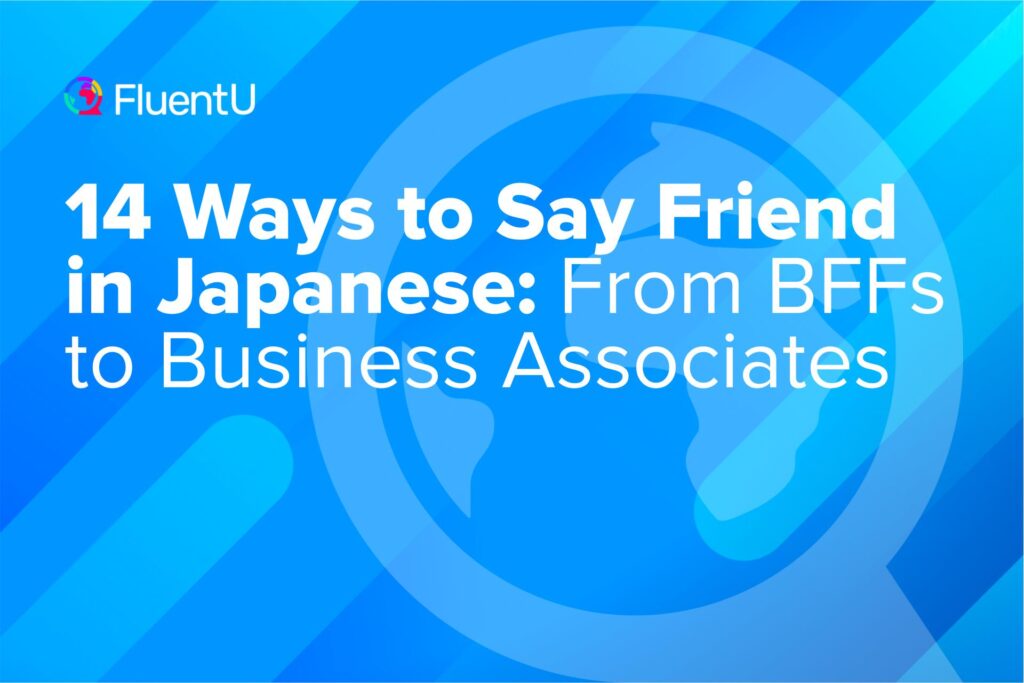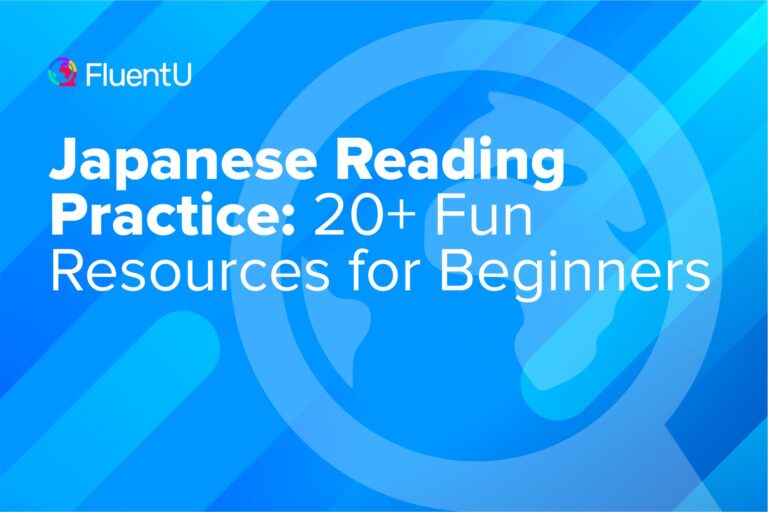Contents
- 1. 友達 (ともだち) — Friend
- 2. 友人 (ゆうじん) — Friend (formal)
- 3. 親友 (しんゆう) — Close friend
- 4. 仲良し (なかよし) — Close friend
- 5. 大親友 (だいしんゆう) — Very best friend
- 6. ダチ (だち) — Buddy, bro (very informal slang, outdated)
- 7. バディ (ばでぃ) — Buddy, friend
- 8. 連れ (つれ) or ツレ — Friend (informal, slang)
- 9. 幼馴染み (おさななじみ) — Childhood friend
- 10. 相棒 (あいぼう) — Partner, friend, associate
- 11. 味方 (みかた) — Ally, supporter
- 12. 仲間 (なかま) — Colleague, fellow, comrade
- 13. 同僚 (どうりょう) — Co-worker, colleague
- 14. 盟友 (めいゆう) — Business colleague or co-worker, political ally
- And One More Thing...
14 Ways to Say Friend in Japanese: From BFFs to Business Associates

With more than 120 million Japanese speakers on the planet, it would be surprising if you didn’t know one or two of them. Inevitably, you’re going to need to describe your relationships with these friends and acquaintances.
There are actually several words in Japanese that express friendship, but most should be used with great care because they’re only used in very specific situations. Let’s go over 14 ways to say friend in Japanese and find out exactly how to use them.
Download: This blog post is available as a convenient and portable PDF that you can take anywhere. Click here to get a copy. (Download)
1. 友達 (ともだち) — Friend
This is the most recognizable word for “friend” that students of Japanese come across, and with good reason. It’s the most analogous in usage to the English word and has the broadest use.
You’ll see the word in movie titles (きみの友だち — “Your Friend”), book titles (彼はトモダチ — “He Is a Friend”) and popular songs (ともだち — “Friend”) as well.
アキラは私の友達です。 (あきらは わたしの ともだち です。) — Akira is my friend.
私の友達は赤いジャケットを着ています。 (わたしの ともだちは あかい じゃけっとを きています。) — My friend wears a red jacket.
私の友達は政府機関に逮捕されました。 (わたしの ともだちは せいふきかんに たいほされました。) — My friend has been arrested by agents of the government.
友達 should also be considered a casual word—polite, but not appropriate for very formal conversation.
You can get even more specific with 友達:
- 飲み友達 (のみともだち) — drinking buddy
- 学校の友達 (がっこうのともだち) — school friend
- 外国人の友達 (がいこくじんのともだち) — foreign friend
- 仕事の友達 (しごとのともだち) — work friend
- 旅行の友達 (りょこうのともだち) — travel friend
- オンラインの友達 (おんらいんのともだち) — online friend
- SNSの友達 (SNSのともだち) — social media friend
2. 友人 (ゆうじん) — Friend (formal)
You might see 友人 (ゆうじん) used in older Japanese language textbooks that rely on a more formal version of spoken Japanese. If a lot of your Japanese practice comes from manga or anime, you’re a little less likely to see this usage outside of very specific scenes.
私の友人は向こうにいます。 (わたしの ゆうじんは むこうに います。) — My friend is over there.
月に住んでいる友人がいます。 (つきに すんでいる ゆうじんが います。) — I have a friend who lives on the moon.
私の友人は月の皇帝です。 (わたしの ゆうじんは つきの こうてい です。) — My friend is the Emperor of the Moon.
3. 親友 (しんゆう) — Close friend
This also refers to someone who’s a close friend. As with 親しい (したしい), 親友 (しんゆう) is reserved for very close friends, and the same rules apply when using it.
彼女の親友は猫です。 (かのじょの しんゆうは ねこ です。) — Her best friend is a cat.
私の親友の猫は私を好きではありません。 (わたしの しんゆうの ねこは わたしを すきでは ありません。) — My close friend’s cat doesn’t like me.
私の親友は誰も猫を飼っていません。 (わたしの しんゆうは だれも ねこを かっていません。) — None of my close friends have cats.
4. 仲良し (なかよし) — Close friend
Similar to the two previous words, 仲良し also means close friend or “chum,” but has a lighter meaning and is used less formally.
If someone is your 仲良し, it means you’re very comfortable with them. You like hanging out together, have common interests and share a strong connection. You click—and you can even use it to describe a group of friends.
私たちは一緒に旅行を楽しむ仲良しのグループです。 (わたしたちは いっしょに りょこうを たのしむ なかよしの グループです。) — We are a close-knit group of friends who enjoy traveling together.
彼らは幼い頃から仲良しです。 (かれらは おさないころから なかよしです。) — He and I have been close friends since childhood.
彼らは仲良しの友達で、いつも一緒に過ごしています。 (かれらはなかよしのともだちで、いつもいっしょにすごしています。) — They are good friends and always spend time together.
5. 大親友 (だいしんゆう) — Very best friend
Many students will recognize that the addition of 大 (だい) to the beginning of 親友 (しんゆう) indicates that 大親友 (だいしんゆう) refers to a very best friend.
私の大親友は魔法の豆を買った。 (わたしの だいしんゆうは まほうの まめを かった。) — My best friend bought some magic beans.
巨大な植物が私の大親友を雲に連れて行ってくれた。 (きょだいな しょくぶつが わたしの だいしんゆうを くもに つれていって くれた。) — A giant plant carried my very best friend up to the clouds.
私の大親友は空の上に立派な城を見つけました。 (わたしのだいしんゆうはそらのうえにりっぱなしろをみつけました。) — My best friend discovered a magnificent castle up in the sky.
6. ダチ (だち) — Buddy, bro (very informal slang, outdated)
While a dated phrase, you may run across ダチ (だち) in an older manga or anime series. It’s slang that’s used mostly by young people and is considered very informal speech. As such, it should be used with care. These days, it probably shouldn’t be used at all unless you’re absolutely confident that you’re using it in the correct context.
Its inclusion in this post is more for you to be able to recognize it when it appears in reading or viewing material.
俺のダチはレースカーが好きだ。 (おれの だちは れーすかーが すきだ。 ) — My friends like race cars.
ダチの車が衝突した! (だちの くるまが しょうとつした!) — My friend’s car has crashed!
ダチが燃えてる!助けてくれ! (だちが もえてる! たすけてくれ!) — My friends are on fire! Help!
Note that when referring to a close friend, you’d say マブダチ (まぶだち) — best buddy/bro (very informal). Again, care should be used, as it’s an outdated phrase and highly informal.
I’d even go so far as to say that you should never use ダチ or マブダチ in a conversation, but at least now you can recognize them when you come across them.
7. バディ (ばでぃ) — Buddy, friend
As you can tell just from the sound, バディ is a loanword that comes from the English word “buddy.” It’s not super common and is only used in casual settings, usually by younger people.
一緒にアウトドア活動を楽しむバディが欲しい。 (いっしょに あうとどあかつどうを たのしむ ばでぃ が ほしい。) – I want a buddy to enjoy outdoor activities with.
バディと一緒に映画を観に行こう。 (ばでぃ と いっしょに えいがを みに いこう。) — Let’s go watch a movie with our buddies.
彼は信頼できるバディで、いつも助けてくれます。 (かれは しんらい できる ばでぃ で、いつも たすけてくれます。) — He is a trustworthy buddy who always helps me.
8. 連れ (つれ) or ツレ — Friend (informal, slang)
連れ, sometimes written as ツレ, is another informal/slang term for a friend or companion and is most often used by young men. As with most slang words, you’re going to want to be careful how you use it and probably avoid it unless you’re certain you’re using it in the right context.
ツレは全員東京に行ってしまった。 (つれは ぜんいん とうきょうに いってしまった。) — All of my friends have gone to Tokyo.
東京に引っ越して以来、俺は連れに会っていない。 (とうきょうにひっこしていらい、おれは つれに あっていない。) — I have not seen my friend since I moved to Tokyo.
連れの消息を聞いたことがあるかい? (つれの しょうそくを きいたことが あるかい?) — Have you heard the news of my friends?
9. 幼馴染み (おさななじみ) — Childhood friend
This is quite a special term in Japanese. Childhood friends or 幼馴染み usually live in the same neighborhood or attend the same school, and the word is often associated with feelings of nostalgia and affection.
幼馴染みとの再会は心が温まる瞬間です。 (おさななじみ と の さいかい は こころ が あたたまる しゅんかん です。) — Reuniting with a childhood friend is a heartwarming moment.
幼馴染みの彼とは家族同然の関係です。 (おさななじみのかれとはかぞくどうぜんのかんけいです。) — My childhood friend is like family to me.
幼馴染みの彼女とは遠く離れていても、心はいつも繋がっている。 (おさななじみのかのじょとはとおくはなれていても、こころはいつもつながっている。) — Even if we are far apart, my childhood friend (female) and I are always connected in our hearts.
10. 相棒 (あいぼう) — Partner, friend, associate
When referring to a partner in a common activity, you might choose to use 相棒 when describing the relationship. The friendship is usually linked to a similar interest in something. 相棒 can describe this relationship in a very friendly manner and is similar to the English word “buddy.”
僕の相棒は二人共、切手収集家だ。 (ぼくの あいぼうは ふたりとも きってしゅうしゅうか だ。) — Both [partners] of them are stamp collectors.
俺の相棒はとってもテニスがうまい。 (おれの あいぼうは とっても てにすが うまい。) — My buddy is a very skilled tennis player.
相棒もチェスクラブにいる。 (あいぼうも ちぇす くらぶに いる。) — My friend is also in the chess club.
11. 味方 (みかた) — Ally, supporter
味方 means a friend who supports, helps, or defends you, often in a specific situation. It’s commonly used in sports or competitions to describe someone who’s on your side or on your team. It also includes friends who stand up for you, especially when you’re having a problem.
私の友人は私の味方でいつも支えてくれます。 (わたしの ゆうじんは わたしの みかた で いつも ささえてくれます。) — My friend is always on my side and supports me.
彼は私の最も信頼できる味方です。 (かれは わたしの もっとも しんらいできる みかた です。) — He is my most trusted ally.
私たちは困難な時にお互いの味方となります。 (わたしたちは こんなんなときに おたがいの みかた となります。) — We become each other’s allies in difficult times.
12. 仲間 (なかま) — Colleague, fellow, comrade
You often hear this word used in anime or see it in manga. It’s a little rarer in general conversation, but it can be used in a few specific contexts. Its meaning stresses the collegial nature of a friendship, either professionally or within a social group. In English, you might associate it with the words “fellow” or “comrade.”
仲間が富士山に登ります。 (なかまが ふじさんに のぼります。) — My friends climb Mount Fuji.
その人は私の仲間です。 (そのひとは わたしの なかま です。) — That man is my comrade.
私達は皆、チェスクラブの仲間です。 (わたしたちは みな、ちぇす くらぶの なかま です。) — We are all friends of the chess club.
13. 同僚 (どうりょう) — Co-worker, colleague
This word refers to a co-worker or colleague.
同僚は今夜、バーで会っている。 (どうりょうは こんや、ばーで あっている。) — My co-workers are meeting at the bar tonight.
同僚は昨夜、非常に酔っていた。 (どうりょうは さくや、ひじょうに よっていた。) — My colleagues got very drunk last night.
同僚は全員、刑務所にいる。 (どうりょうは ぜんいん、けいむしょに いる。) — All of my co-workers are in jail.
14. 盟友 (めいゆう) — Business colleague or co-worker, political ally
When referring to a business colleague or when indicating an ally in a political context, you can use 盟友.
私の盟友は政治職に立候補しています。 (わたしの めいゆうは せいじしょくに りっこうほ しています。) — My colleague is running for political office.
私は緑の党に盟友がいません。 (わたしは みどりのとうに めいゆうが いません。) — I have no allies in the Green Party.
盟友と私は固い握手を交わした。 (めいゆうと わたしは かたい あくしゅを かわした。) — My colleague and I clasped hands.
While Japanese speakers may not explicitly discuss friendship among each other, there’s no shortage of Japanese words or phrases to indicate a variety of friendship types.
The range of words referencing friendship outnumber those in English, but, as with any language, it’s important to understand the context behind a word before using it. This means that using contextual learning like the immersive video-style learning on FluentU is one of the best ways to know how to use these words in actual conversation.
FluentU takes authentic videos—like music videos, movie trailers, news and inspiring talks—and turns them into personalized language learning lessons.
You can try FluentU for free for 2 weeks. Check out the website or download the iOS app or Android app.
P.S. Click here to take advantage of our current sale! (Expires at the end of this month.)

In most cases, 友達 (ともだち) and 友人 (ゆうじん) are the safest choices.
But, go ahead and explore the broad spectrum of ways to express friendship in Japanese. Talking about friendship is always a good thing!
Download: This blog post is available as a convenient and portable PDF that you can take anywhere. Click here to get a copy. (Download)
And One More Thing...
If you love learning Japanese with authentic materials, then I should also tell you more about FluentU.
FluentU naturally and gradually eases you into learning Japanese language and culture. You'll learn real Japanese as it's spoken in real life.
FluentU has a broad range of contemporary videos as you'll see below:

FluentU makes these native Japanese videos approachable through interactive transcripts. Tap on any word to look it up instantly.

All definitions have multiple examples, and they're written for Japanese learners like you. Tap to add words you'd like to review to a vocab list.

And FluentU has a learn mode which turns every video into a language learning lesson. You can always swipe left or right to see more examples.

The best part? FluentU keeps track of your vocabulary, and gives you extra practice with difficult words. It'll even remind you when it’s time to review what you’ve learned. You'll have a 100% personalized experience.
Start using the FluentU website on your computer or tablet or, better yet, download the FluentU app from the iTunes or Google Play store. Click here to take advantage of our current sale! (Expires at the end of this month.)







